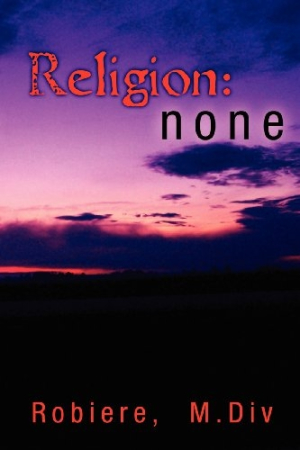Religion: none
A Wake-up Call for Humanity
Religion: none is a meticulously researched take on a theory of how and why Christianity was created by the early Romans as a means to control the populace and to grow wealthy by imposing a “god” upon them. Robiere, a writer with more passion than talent, traces the often surprising birth and proliferation of all the accoutrement of the new religion. From the alleged fabrication of Jesus and Paul in the third century through nearly two thousand years of often brutal control and manipulation of facts by the Roman Catholic Church, to the passive compliance of many contemporary Christians and Muslims, Robiere vehemently challenges the status quo.
Robiere writes in a detached style, never speaking in first person, and most often using the pronouns “they” (which he makes interchangeable with “shepherds” or the power elite) and “you” (interchangeable with “sheep” or “flock,” Robiere’s monikers for the ignorant masses). These overdone grammatical affectations, combined with repetition of facts and redundancy of concepts, make Religion: none a tome that is difficult to slog through. For example, in the chapter “History is Written by the Victor,” a typical sentence reads, “As shepherds promote and enforce their egocentric, blind faith-based, holier-than-thou mind-set on the flock, they expand their influence and selfish desire to play god by directing the course of people’s lives.”
Robiere, a former minister with a master’s degree in divinity, and the son of a successful minister, discovered—when he attempted to explore the boundaries of his faith—that “his mind hit the brakes. He was stunned by the realization that he did not know that he did not know what he did not know, so he set out to find it.” This statement appears near the end of Religion: none, when the reader finally gets a clear understanding of the chain of events and epiphanies that fueled Robiere’s passionate denunciation of all things religious. Up to this point, the book reads like a typical atheistic exposé written by a disillusioned young person who thinks he has discovered something extraordinary that will change the world, if only he can get enough people to read his manifesto.
Unfortunately, most readers are unlikely to make it to Robiere’s sincere and well-written chapter about his personal quest for truth. Especially moving is the transformation of Robiere’s father, who realizes, in retirement, that he had been living and preaching a lie. Together, the two men explore reality on the other side of the Christian religion that formed their worldviews, and they come to a place of peaceful acceptance.
Reviewed by
Patty Sutherland
Disclosure: This article is not an endorsement, but a review. The publisher of this book provided free copies of the book and paid a small fee to have their book reviewed by a professional reviewer. Foreword Reviews and Clarion Reviews make no guarantee that the publisher will receive a positive review. Foreword Magazine, Inc. is disclosing this in accordance with the Federal Trade Commission’s 16 CFR, Part 255.

